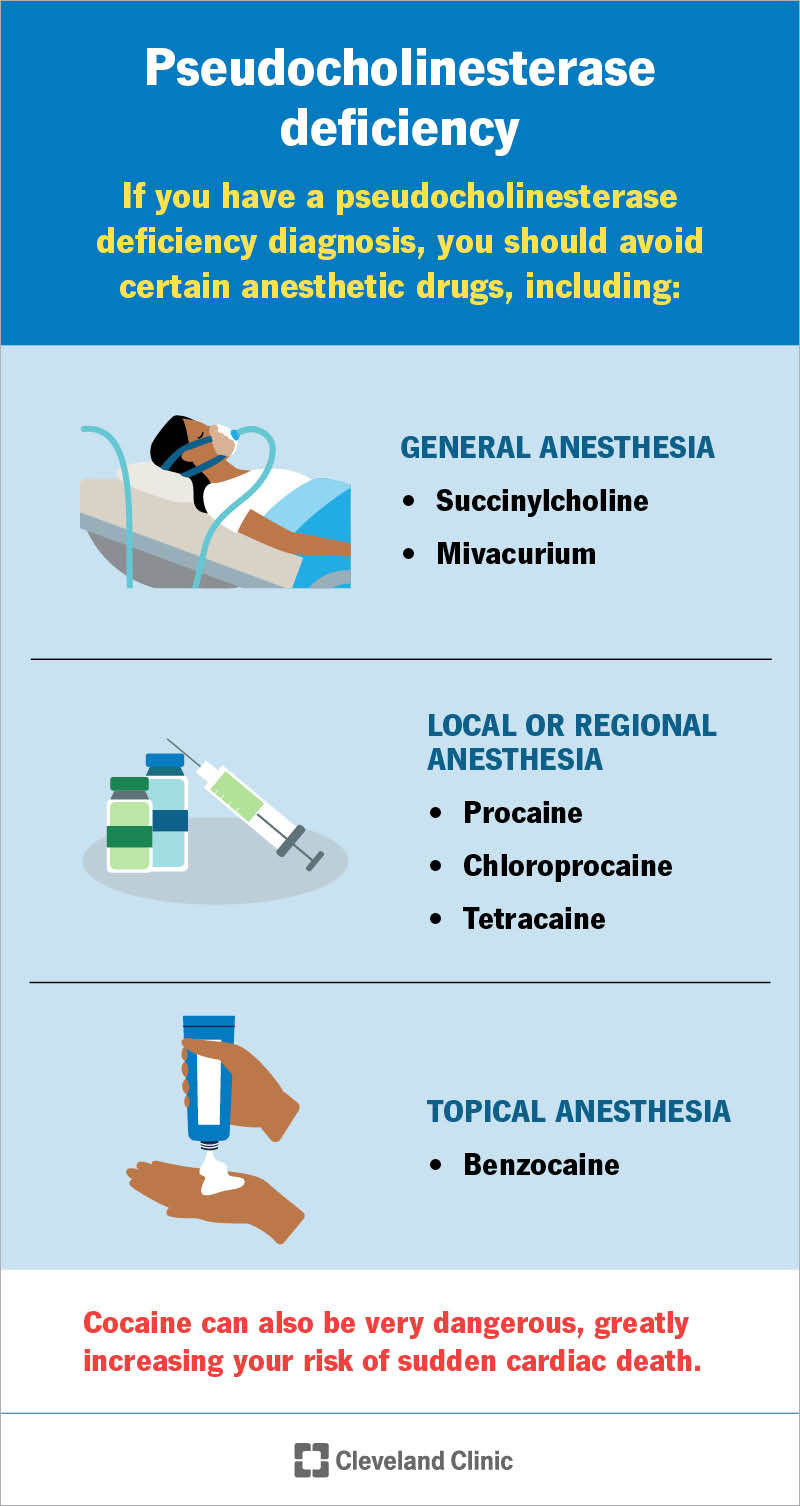Pseudocholinesterase deficiency is a condition that makes you very sensitive to certain anesthetic medications. You may not be able to move or breathe on your own for several hours after receiving these medications. Mechanical ventilation supports your breathing until you recover.
Advertisement
Cleveland Clinic is a non-profit academic medical center. Advertising on our site helps support our mission. We do not endorse non-Cleveland Clinic products or services. Policy

Image content: This image is available to view online.
View image online (https://my.clevelandclinic.org/-/scassets/images/org/health/articles/pseudocholinesterase-deficiency.jpg)
Pseudocholinesterase deficiency (also known as butyrylcholinesterase deficiency) is a rare condition that causes prolonged side effects of certain medications used during general anesthesia to relax your muscles. You may have muscle paralysis for longer than expected. And you may not be able to breathe on your own. This reaction is temporary. Your healthcare team knows how to manage it safely.
Advertisement
Cleveland Clinic is a non-profit academic medical center. Advertising on our site helps support our mission. We do not endorse non-Cleveland Clinic products or services. Policy
Pseudocholinesterase (soo-doe-ko-luh-NEH-stur-ays) is an enzyme your liver typically makes. It helps break down certain anesthetic medications used to relax muscles called choline esters. Breaking down these medications helps your body recover normal muscle movement and breathing after surgery. These medications include succinylcholine and mivacurium.
When you lack (have a deficiency of) this enzyme, these medications last several hours longer than usual in your body.
People with the condition usually don’t know they have it until they receive choline esters during anesthesia. Your healthcare team will act quickly to keep you safe until the medications are out of your body.
Pseudocholinesterase deficiency symptoms only happen when you’re exposed to certain anesthetic medications, called muscle relaxants. Symptoms include:
Your healthcare team will likely recognize these symptoms before you’re aware of them.
There are two types of pseudocholinesterase deficiency:
A change in the BCHE gene causes the inherited form of the condition. This gene contains instructions that your body uses to make the pseudocholinesterase enzyme. If you have the BCHE gene change, you either make very little of this enzyme or none at all.
Advertisement
You can’t prevent inherited pseudocholinesterase deficiency. But if it runs in your biological family, you can get tested for it before undergoing general anesthesia. This can help you avoid anesthetic complications.
Certain health conditions and medications can cause your liver to make less pseudocholinesterase.
Health conditions that may result in the deficiency include:
Medications that can increase your risk of developing the deficiency include:
You can’t always prevent this condition. But you may be able to lower your risk by treating underlying conditions or asking your provider if switching medications is an option for you.
Your healthcare provider may suspect pseudocholinesterase deficiency if you have trouble regaining muscle control and breathing after general anesthesia. To confirm your diagnosis, they can run a blood test to check your pseudocholinesterase enzyme levels.
You may also learn you have the condition if you get genetic testing due to a family member having it.
You’ll likely need immediate medical care while you’re under anesthesia. Your healthcare team will keep you sedated (unconscious). They’ll use mechanical ventilation (machine-assisted breathing) to help you breathe.
They’ll do this until the effects of the muscle relaxant wear off, and you can safely breathe on your own again. It can take several hours for these symptoms to improve. The timeline varies from person to person.
For future general anesthesia needs, your provider can use other types of muscle relaxants that don’t depend on the pseudocholinesterase enzyme. Rocuronium is one of the most used muscle relaxants for people with this condition.
If you have a pseudocholinesterase deficiency diagnosis, you should avoid certain anesthetic drugs, including:
These medications may last longer than expected in your body, which could lead to serious side effects. Using cocaine can also be very dangerous if you have this condition. It can greatly increase your risk of sudden cardiac death.
Advertisement
Always tell all your healthcare providers — including dentists — about your pseudocholinesterase deficiency diagnosis. Especially those you see for surgical procedures.
You should also let your family know so they can get tested for the BCHE gene change. That way, they can inform their providers before undergoing any type of surgery.
Consider wearing a medical ID bracelet that informs providers about your condition. This can be helpful if you ever need emergency surgery.
Having surgery can be stressful. Most of us worry so much about the procedure that we don’t consider that we could have a negative reaction to anesthesia.
There’s no cure for pseudocholinesterase deficiency, but it’s very manageable. Knowing whether you have it can help you avoid issues after surgery. If you have the condition, tell other family members so they can get tested and avoid potential complications on their health journeys.
Advertisement

Sign up for our Health Essentials emails for expert guidance on nutrition, fitness, sleep, skin care and more.
Learn more about the Health Library and our editorial process.
Cleveland Clinic’s health articles are based on evidence-backed information and review by medical professionals to ensure accuracy, reliability and up-to-date clinical standards.
Cleveland Clinic’s health articles are based on evidence-backed information and review by medical professionals to ensure accuracy, reliability and up-to-date clinical standards.
Sometimes you have surgery planned. Other times, it’s an emergency. No matter how you end up in the OR, Cleveland Clinic’s general surgery team is here for you.
